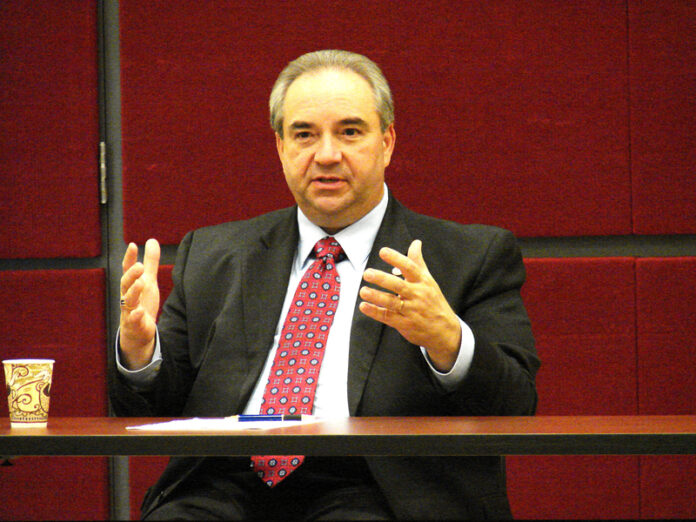Lt. Governor Bill Bolling sees light at the end of the tunnel for Virginia’s economy, and is hoping that light is not a train coming in the form of a “double-dip” recession.
Monday morning the Lt. Governor heard concerns and appreciation for the improvements to Virginia’s business climate. Bolling met with the Roanoke Regional Partnership and the Roanoke Chamber Executive Committee Monday morning at the Claude Moore Education Complex. Accompanying the Lt. Governor was his chief of staff, Randy Marcus and Mary Carter, Deputy Secretary for Rural Economic Development in the Department of Commerce and Trade.
Questions and comments came from planners and administrators of the cities of Salem and Roanoke as well as the counties of Roanoke, Franklin and Botetourt. Beth Doughty, Executive Director at the Roanoke Regional Partnership, led the freeform roundtable with the partnership.
John Williamson, President and CEO of Roanoke Gas, and Neil Wilkin, CEO of Optical Cable, were among the contingent of business interests.
Bolling remarked that although Virginia is a business friendly state, it was “falling farther and farther behind other competitive states, lagging in the resources it had dedicated to economic development and job creation.” To rectify past neglect, Bolling highlighted the aggressive bipartisan legislation in 2010 that expanded the Governor’s Opportunity Fund and added $57.5 million in job creation programs.
“We are not done,” said Bolling. Part two on the agenda comes with the completion of a final report by the Economic Development Commission on September 31. That will be followed by four months of study to determine “what goes into next year’s package from a legislative budget standpoint.”
At least part of the package will include resources for an Emerging Technologies Fund and a Tourism Development Fund. Key emphasis will be placed on small business development.
When it came to tax reform proposals, Bolling admitted that the resulting fiscal implications at the local level would be a hard sell. According to Roanoke City Director of Finance, Ann Shawver, elimination of the BPOL tax (Business Professional Occupation License) would result in a five percent hit to Roanoke’s revenue.
“There are a lot of businesses with capital on the sidelines … all the policies are wrong … businesses are scared to death to hire,” proclaimed Bolling. He didn’t see that changing until the November elections.
Bolling heard from business leaders who cautioned not to forget existing businesses while trying to recruit others.
Beth Doughty wants to see the DBA (Department of Business Assistance) strengthened and improvements in workforce development initiatives. Bolling outlined a workforce development initiative in the form of job training and charter schools, saying “there are many children that have an aptitude for a skilled trade.” As an example, Bolling quoted a salary of $52,000 a year for an electrician at Goodyear Tire and Rubber he visited in Danville.
Bolling heard opinions on transportation issues including air, rail and I-81 as well as support for the intermodal rail project in Elliston. Joyce Waugh, President of the Roanoke Chamber, commented that they had not taken a stand on the privatization of the ABC liquor stores.
Bolling admitted that privatization of the state’s ABC stores; I-95 toll roads and $500 million in transportation bonds are temporary fixes that will provide revenue primarily going to maintenance. He blamed the General Assembly for the delay in a transportation funding solution – Republicans who did not want to see any tax increase, and Democrats who couldn’t decide on which taxes to increase.
During the Roanoke Chamber’s Executive meeting, access to capital for small businesses was the hot topic. Charlie Robbins, Regional President at BB&T, said that bankers are getting mixed signals saying, “It is hard to comply with regulations from a risk management perspective …we have money to lend but it’s hard as hell to lend it . . .”
Robbins summed up the lending environment calling “verifications painstaking and laborious – it beats the client to death.” Bolling sought to console him by saying that the state is looking at expanding the direct loan program and loan guarantee program. He hoped legislation that failed this year would pass next year with better explanation to legislators.
Delegate Bill Cleaveland and State Senator Ralph Smith attended the Roanoke Chamber Executive meeting with the Lt. Governor.
By Valerie Garner [email protected]
